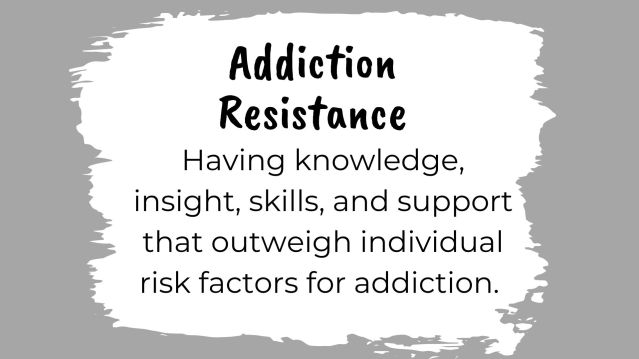Addiction
We Need to Stop Trying to Raise “Drug-Free” Kids
The important shift away from abstinence to addiction resistance.
Posted May 13, 2024 Reviewed by Michelle Quirk
Key points
- Kids and teens lack basic knowledge about what alcohol and drugs actually do in their brains and bodies.
- School-based alcohol and drug education programs are incomplete, and there is an important role for parents.
- Addiction resistance is a more realistic goal than abstinence.

“Beer then liquor, never sicker… Liquor then beer, never fear.” This was a common refrain when I was a Gen X teenager. Besides “Don’t drink and drive,” this was the extent of how I was taught to drink responsibly. Like most kids, most of my knowledge about alcohol and drugs didn’t come from my parents or my school’s alcohol and drug education programs.
Now I am a clinical psychologist, professor of psychology, and mother to three young kids who have a genetic vulnerability to addiction. I’ve spent the past 20 years studying addiction and providing evidence-based addiction treatment. I’ve helped thousands of people better understand the risk and protective factors that influence why one person develops addiction when another doesn’t. I’ve heard countless “If only I had...” stories from parents, students, and people in addiction recovery.
Problems With School Alcohol/Drug Prevention Programs
Each semester that I taught college courses on addiction, I was dismayed by students' lack of basic knowledge about what psychoactive substances actually do in their brains and bodies. They shared their personal experiences with “alcohol/drug education” programs they encountered in their school settings, and these accounts typically share a common refrain—these “prevention” initiatives become jokes, trigger rebellious substance use, or have little to no impact on their substance use decisions.
At worst, prevention programs create shame for people struggling with their substance use and actually impede help-seeking by shutting down communication with adults. Abstinence-only and anti-drug programs cause people to internalize stigmatizing messages like “Users Are Losers,” “Just Say No” (like it’s just that simple and easy for everyone), and “Good Kids Don’t Get High.” Yet they also recognize the disparity between the way that alcohol is discussed compared to other drugs, and that inconsistency leads to confusion.
To receive federal funding, schools must check a box on the annual paperwork stating they deliver alcohol/drug education programming to their students. But there is no metric for what that education includes. So, many schools are able to check that box (and retain their funding) with “Red Ribbon Week” activities like “On Wednesday, wear neon to show you’re too bright for drugs!”
When we talk about addiction prevention, we typically focus on school-based curricula. But that misses two key elements that are critical for helping kids develop the resilience and protective factors they need to combat addiction and other mental health struggles—school policies and parent training. At home, many parents assume their kids are either too young to talk about alcohol and drugs or that the school will provide the essential knowledge their kids need to be “drug-free.”
My parenting tactics are different, and definitely the minority (for now). My 9-year-old knows how to recognize the signs of alcohol intoxication and knows that drugs like methamphetamine can alter one’s perception of reality. I am purposely raising my kids to know that it’s not the substance (alcohol or drugs) that is the problem, but that other factors make some people more vulnerable to substance use becoming dysfunctional. My kids will all know at a young age that since genetic predisposition accounts for 50 percent of the chance of developing addiction, they are 10 times more likely to develop addiction than their friends without a family history of addiction.
Building Addiction Resistance
Why does my 9-year-old know more about the risk factors for addiction than most college students? Because I’m not trying to raise “drug-free” kids. As a clinical psychologist specializing in evidence-based addiction treatment, I’m trying to raise addiction-resistant kids. I fully accept the likelihood that they will use alcohol or other drugs at some point. Instead of trying to scare them out of that choice or build shame and stigma around the addiction history in our family, I am choosing to provide them with the essential knowledge and skills they need to make informed decisions about substance use. Building their addiction resistance gives them the best chance to navigate the hellscape of adolescence with healthy coping skills instead of turning to alcohol and drugs to self-medicate, tolerate distressing thoughts or feelings, or foster a sense of belonging with their peers.
My approach definitely isn’t popular (yet), but I am developing the Raising Resilient and Addiction-Resistant Kids program to provide a viable alternative to abstinence-only messaging. Many parents have trouble stepping outside of the narrative that trained them to think that providing honest education about alcohol and drugs somehow condones their use and leads to a higher risk of addiction, but many others are ready for a different approach.
In a feel-good-all-the-time society like the United States, how can we expect kids and teens to make informed choices about alcohol and drugs if we don’t provide them with the foundational knowledge and skills they need to do so? How can we tell them to “Just Say No" when that message is overly simplistic and fuels stigma against substance users that perpetuates innumerable social injustices in the pursuit of “drug-free communities”?
The “Users Are Losers” message shuts down communication lines between students and educators, and children and parents. We’ve made so much progress destigmatizing mental health struggles like depression, anxiety, autism, and posttraumatic stress disorder, yet we continue to perpetuate the Us vs. Them mentality when it comes to substance use and addiction. Where does that leave kids whose risk factors for addiction outweigh their protective factors?
If we truly want to reduce addiction… If we truly want to reduce drug overdose deaths… If we truly want to “save our kids” from drugs, then we need to stop trying to raise “drug-free” kids and focus on raising addiction-resistant kids instead.

Copyright 2024 Kelly E. Green and Grind Wellness, LLC




